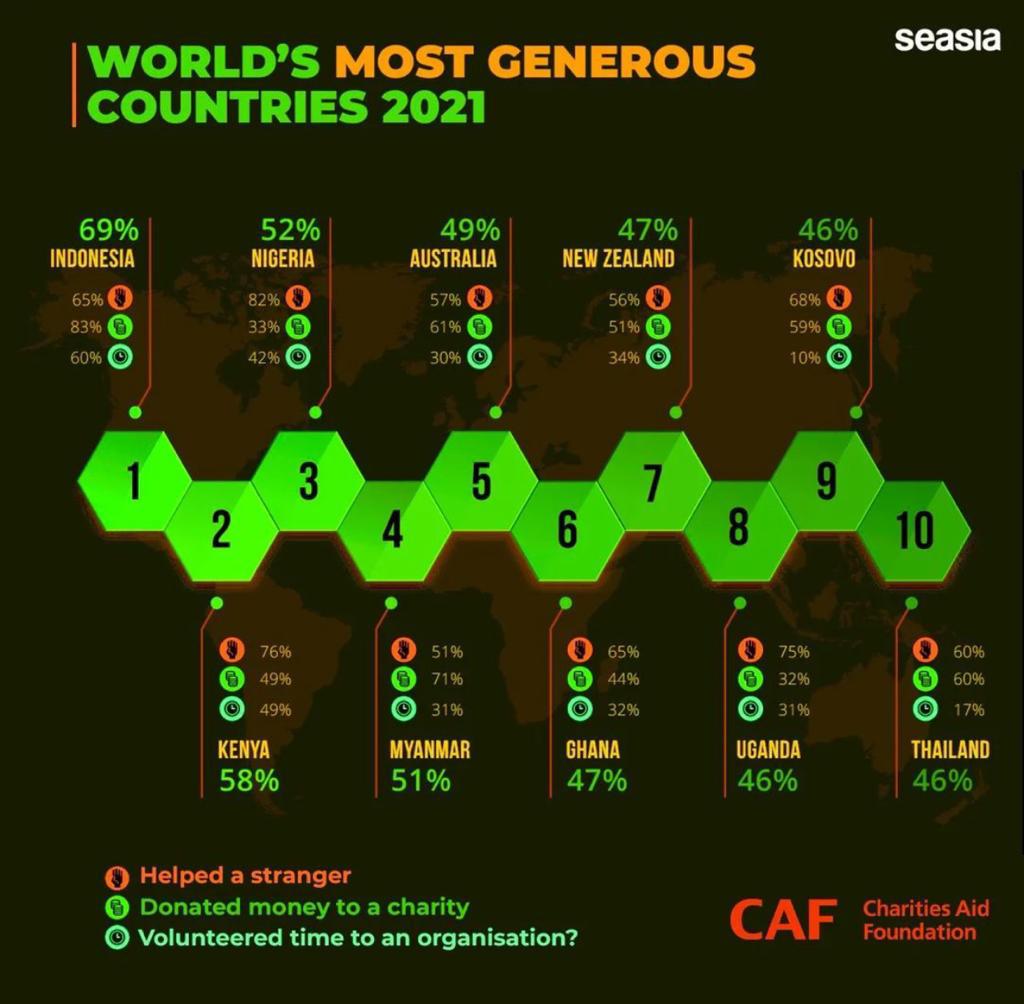The Charities Aid Foundation (CAF) announced the World Giving Index (WGI) report on June 14th, 2021, which ranked Indonesia first with a score of 69 percent, up from 59 percent in the previous yearly index published in 2018. Indonesia was also #1 in the WGI at the time.
The World Giving Index (WGI) is an annual report released by the Charities Aid Foundation that ranks more than 140 nations throughout the world based on how charitable they are, using data collected by Gallup. Indonesia scores in the top two out of three categories or indicators in the WGI 2021 report, which include helping a stranger, donating money, and volunteering time.
According to CAF's research, more than eight out of ten Indonesians gave money this year, and the country's volunteerism rate is three times greater than the global average.

Hamid Abidin, the director of Filantropi Indonesia, said the pandemic and the economic crisis did not seem to deter Indonesians from donating. The pandemic and crisis heightened people's desire to aid others.
Several elements, according to Hamid, contribute to Indonesia's ability to maintain its reputation as a compassionate country:
First, Religion as a driver for giving:
Zakat (together with infaq and alms) is a traditional type of Islamic charity that is commonly practiced in Indonesia, with the benefits going to the poor.
According to reports, Zakat payments were exceptionally high in 2020 as a result of the pandemic. Religious leaders in Indonesia have urged individuals to utilize such payments to support those in their areas who are suffering as a result of the pandemic's economic downturn.
According to Outlook Zakat Indonesia 2020, present zakat donations are anticipated to be Rp 8 trillion, but they might rise to Rp 233 trillion (US$16.6 billion) if collections are digitized further.
Second, Local traditions and mutual aid:
Volunteerism in the country is more than three times the global average. This exemplifies Indonesians' continuous engagement with gotong-royong, a practice of mutual aid that cuts across islands, ethnicities, and faiths, especially in times of crisis.
Third, Digital transformation:
Diverse actors in Indonesia's philanthropy sector appear to have been effective in mainstreaming the use of digital platforms for various philanthropic activities, including mass giving participation. Due to social isolation and other efforts, fundraising during the pandemic was limited, as it was in many other nations.
However, by utilizing giving platforms and internet fundraising, these limitations were circumvented. During the pandemic, online donations surged by 72 percent.
Even before to the pandemic, there was a noteworthy increase in the amount of online donations to organizations and good causes via digital channels, a trend that continued during the crisis. A variety of grassroots crowdfunding initiatives were set up to generate millions for community support and Covid-19 relief operations during the crisis, facilitating mass engagement with online donating.
Fourth, Youth involvement, role models, and the use of social media:
Indonesia has seen an increase in public advocacy of charity and giving by notable persons, opinion leaders, and influencers. For example, one major Instagram influencer was able to raise about USD 500,000 in a week from her followers for Covid-19 relief efforts in late 2020.
They attracted a wider audience through old and new communication venues, including social media, and in particular young people who became interested in the matter. According to a recent survey of donors, younger persons (24-39 years old) are the most regular donors compared to other age groups, with 1.5 gifts per month on average.
In Indonesia, there are numerous great developments to be proud of. Sector voices, on the other hand, call for more adjustments to assist promote Indonesia's philanthropy sector and expand philanthropic engagement, as well as the impact it can have on societal progress.
Source: CAFonline.org, Wingsweb.org, Filantropi.or.id


















